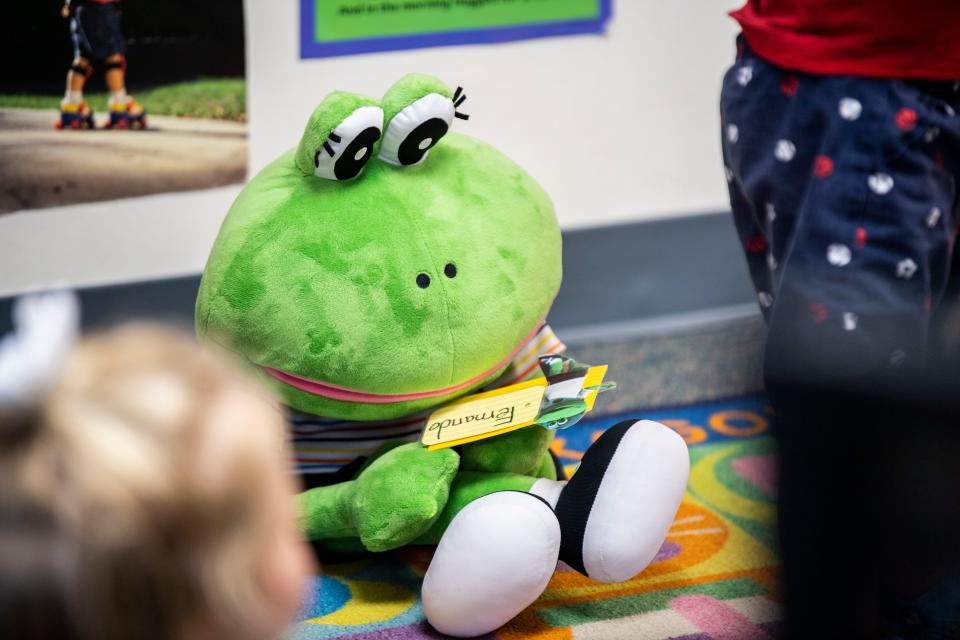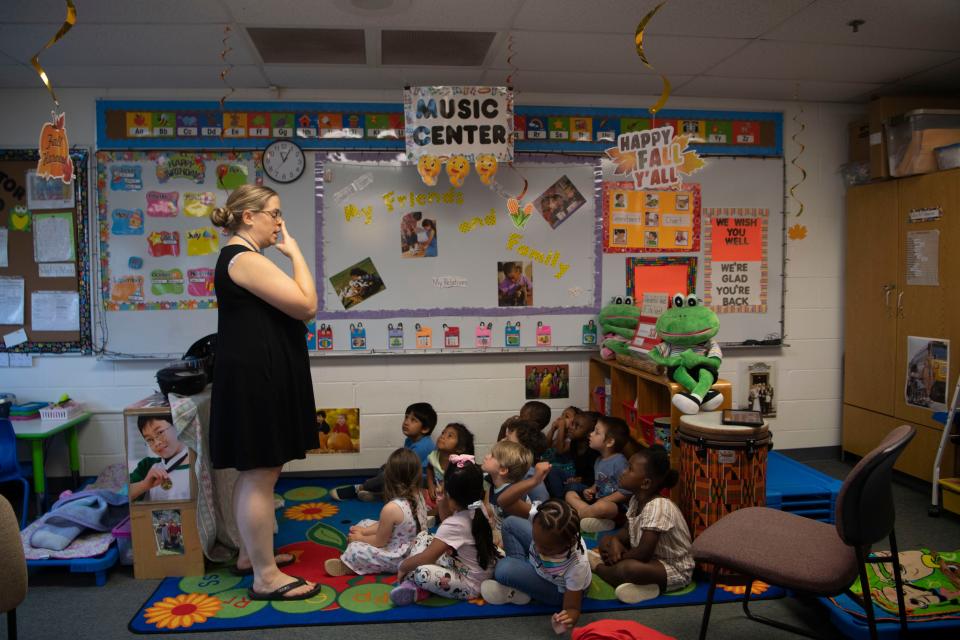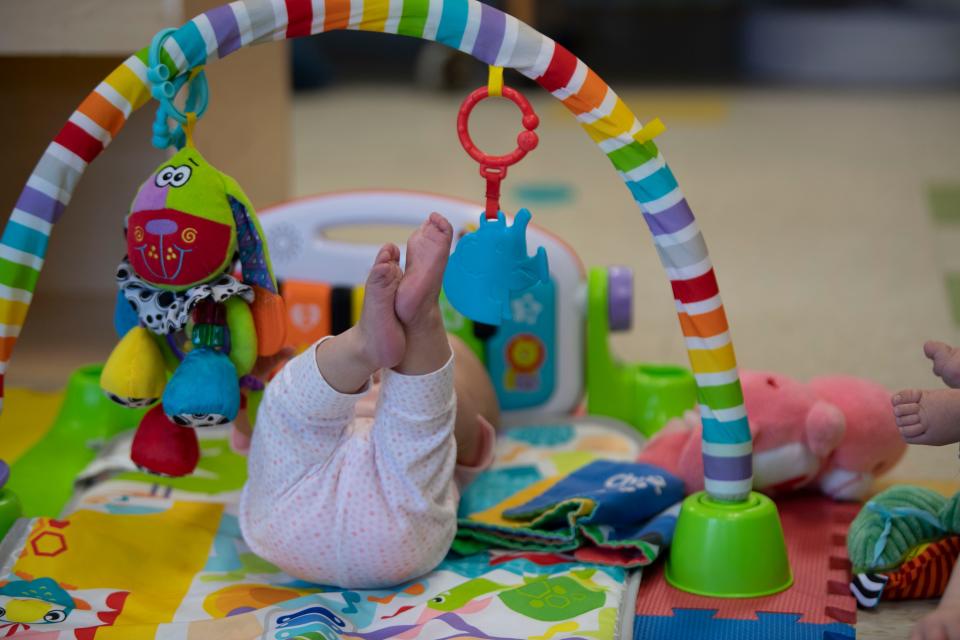Tennessee child care providers brace for funding 'cliff' that could leave parents with even fewer options
Fernando sat quietly among a group of students at St. Mary Villa Child Development Center on Monday morning as a teacher read to them.
“What does Fernando do?” the teacher asked.
“Nothin’,” a little girl quickly answered, prompting a few laughs.
It’s important to note that Fernando is a stuffed frog. The teachers use him to model how to sit quietly and pay attention to the pre-K class at St. Mary Villa, a North Nashville child development center that cares for children from infancy to 5 years old.

St. Mary is among the 220,000 child care programs nationwide facing the expiration of $24 billion in COVID-19 pandemic relief funds on Sept. 30. The U.S. Department of Health and Human Services estimates those funds, awarded to more than 80% of the country’s licensed child care centers, covered nearly 10 million children. The money helped with things like personnel costs, rent, utilities and personal protective equipment.
The American Rescue Plan Child Care Stabilization Funds, or ARPA, were geared toward shoring up pandemic-inflicted losses. Tennessee alone has disbursed $540 million in ARPA funds to child care agencies for staff retention and other operational costs.
But the ARPA funds also served to steady an industry that had already been floundering for years.
Now, the funding cutoff could have vast impacts, potentially shuttering nearly 70,000 programs and eliminating around 3 million child care spots nationwide, according to progressive public policy think tank The Century Foundation.
In Tennessee, nearly 1,200 programs and 90,000 child care spots are at risk in a state some experts say is already a “child care desert.”
"I don’t think we’re taking the issue of child care seriously in this state and how critical of a need that is for working parents, and how critical it is to the overall economy," said state Sen. Charlane Oliver, D-Nashville.
Meanwhile, child care costs continue to skyrocket at rates household incomes can't match.
“We know that child care is incredibly expensive,” Tennessee Council on Children and Youth Director Richard Kennedy said at a recent legislative hearing. “It costs more to keep an infant in child care in Tennessee than it does to pay for a year’s tuition at the University of Tennessee.”

The loss of the pandemic-era funding could jeopardize staff pay. Centers may struggle to retain quality employees without raising their pay, which could lead to employers cutting capacity or raising tuition costs. Either scenario will trickle down to Tennessee families, who could see decreased availability of child care options or an increase in costs — or possibly both.
Rhonda Trumbo, the executive director at King’s Daughters Child Development Center in Madison, said her center reopened with just 18 children after closing for six weeks at the beginning of the pandemic. The relief money was crucial to getting them back on their feet.
As the funding cliff looms, Trumbo said her board is hard at work fundraising, so they don’t have to hike tuition or stall out wages, especially amid increased costs of living and lingering inflation.
“It’s already very tough out there,” Trumbo said. “We're not going anywhere, but I'm not saying it’s going to be an easy road.”
Ripple effects
The funding cliff and potential closures or reductions in child care center capacities have ripple effects far beyond the immediate family unit. For example, families may pull a parent back from the workforce if they can't find or afford child care.
This burden disproportionately falls on women, according to Oliver, the state senator. But staying at home is also not an option for some families, and the dire reality of juggling work and child care responsibilities alone may lead to severe consequences such as job loss, poverty and homelessness.
Child care is not solely a mother's issue or family issue, Oliver said.
"We need to shift from that mindset to viewing child care as a workforce development issue," she said.
While having longtime, quality staff is the norm for St. Mary, it’s not the norm for the industry, according to St. Mary center director Alyssa Garnett. That’s why keeping wages competitive for employees was among the priorities for their pandemic relief money.

Most children are there 10 hours a day and have breakfast, lunch and an afternoon snack, along with being taught age-appropriate curriculum. Tuition fees listed on the center’s website top out at around $1,420 per month for infants, with the lowest rate listed at about $650 per month for preschoolers. Tuition is adjusted based on annual household income.
“If you break that down by hour, how many hours these children are here, you're still paying less than minimum wage for your kid to be here,” Garnett said.
While the COVID-19 relief money was a lifeline for St. Mary, especially as they saw a dip in enrollment during the pandemic, Garnett said losing it now takes away some of their cushion but is not “life or death.” She feels her center is prepared for the change but worries about what it means for countless others in Tennessee and beyond.
“Most centers run tuition payment to tuition payment, just like parents live paycheck to paycheck,” she said. “They don't have a rainy day fund.”
Centers may be forced to increase tuition to keep employee pay and benefits favorable, or to decrease pay, skip raises or cut benefits in an industry already plagued by worker shortages and high turnover. Garnett hopes state and federal leaders will take a hard look at what it means to support early child hood centers in every community.

Tennessee's plans
The expiration of other pandemic-era funds may further squeeze families, including $15 billion that expanded a grant to help low-income families pay for child care. That money is set to expire at the end of September 2024.
U.S. Department of Labor estimates put the average for center-based infant care around $11,300 per year, while toddler and pre-school care lands just over $9,000. That comes out to roughly 11-14% of the median income for a Tennessee family.
Tennessee distributes its ARPA funds through the Department of Human Services, which said despite the Sept. 30 deadline for the "stabilization funds," some supplemental funding is available for the next year. DHS accepted applications for these funds until early September and plans to pay out the funds to child care agencies "over the next several months," according to a department spokesperson.
Meanwhile, Tennessee has established a salary "supplement" program, sending annual funds to child care educators working at licensed facilities. The awards, aimed at reducing staff turnover and supplementing low pay, start at $600 annually and cap out at $3,750, depending on how many early childhood college credits the educator has. The Tennessean has requested further information regarding the amount Tennessee has rewarded under the program since 2022.
Danielle Cotton, the public information officer for DHS, said this is a "critical time to focus on and expand upon investment from the private sector," a hallmark of Tennessee government under Gov. Bill Lee, who continually touts public-private partnerships.
Cotton said "engagement from employers is a key strategy for long-term access and affordability," pointing to a new collaboration with Tyson Foods that established a company-sponsored, on-site child care agency to serve 100 children of Tyson employees.
"It is our goal to increase employer-led efforts across the state to expand access to affordable child care that is tailored to the needs of working families," Cotton said.
Reach reporter Rachel Wegner at RAwegner@tennessean.com or find her on Twitter at twitter.com/rachelannwegner.
This article originally appeared on Nashville Tennessean: Why Tennessee parents could have even fewer child care options

